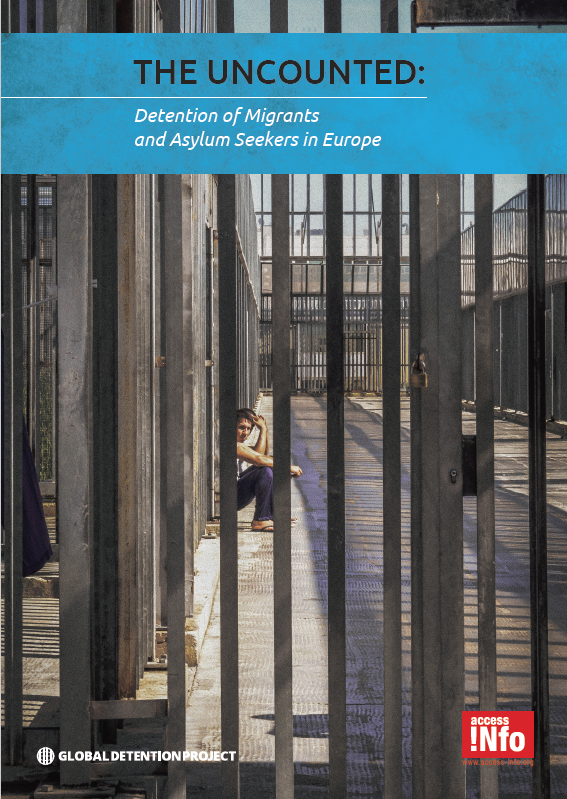Madrid/Geneva, 17 November 2015 – A serious lack of information about the number of migrants and asylum seekers in detention across Europe is impeding informed public debate, report Access Info Europe and the Global Detention Project following submission of access to information requests in 33 countries.
The report comes as EU heads of government meet in Brussels for their last summit of the year, with migration a key topic. This lack of publicly available information on the scale and nature of detention is of particular concern now as Europe seeks to restrict the arrival of refugees.
In the report issued today “The Uncounted: Detention of Migrants and Asylum Seekers in Europe”, the two organisations reveal that of the 33 countries contacted (31 in Europe plus Canada and the USA), only six – Hungary, Lithuania, Luxembourg, Poland, Slovakia, and Sweden – provided full information on the locations of detention centres and the number of detained migrants, including minors and asylum seekers.
Strikingly, Germany responded that it did not hold any of this information as it is held at the Lander level. Slovenia was unable to answer the question on the total number of migrants in detention.
Even when officials could provide statistics on the number of people detained, a number of countries – including Finland, Ireland, the Netherlands, and Switzerland – could not provide numbers on detained asylum seekers, stating they do not hold disaggregated data on reasons for detention.
“Given the paucity of data apparently collected by some European governments on this issue, it must be challenging to shape appropriate policies or to assess the efficacy of those that are already in place, both at the national and regional levels,” said Michael Flynn, Executive Director of the Global Detention Project, based in Geneva.
A particularly concerning finding of the study was the lack of information about minors in detention. A full 19 of the 33 countries failed to provide a breakdown of the numbers of unaccompanied and accompanied minors in detention.
Another finding of the research was that even when data was provided it was poorly organised and stored in such a variety of ways that it was hard to compare. For example Greece provided data on the number of arrests (76,878 in 2012) but not on the numbers actually detained for any period of time.
“With EU governments and the European Commission now talking of more flexible detention standards to handle new arrivals, it is essential that both governments themselves and independent human rights organisations have accurate data on the conditions in which migrants are being held,” added Helen Darbishire, Executive Director of Access Info Europe, based in Madrid.
The report has revealed further vagaries in the way European countries count detention of migrants. For example, the Czech Republic provided data on detention centres and reception centres where minors are housed. In response to a query about the difference between these facilities, we were told by email that “the fence in a detention center is higher than in a reception center.”
One country, Bulgaria, told researchers that they did not need to provide the requested information because they claimed to provide it the EU statistics agency, Eurostat. However, when the project team contacted Eurostat asking for this information, the agency said that they do not collect statistics on immigration detention.
A priority recommendation in the report is that the European Union develop a harmonised definition for what constitutes “immigration-related detention” and how facilities should be categorised. The EU should also set up a region-wide mechanism for the collection of statistics on immigration detention so as to ensure that all people deprived of their liberty in any type of facility for reasons related to their immigration status are accounted for.
“As Europe’s response to the large flows of refugees arriving at its borders turns increasingly restrictive, it is paramount that we be able to promptly observe what is happening to people when they are taken into custody,” concluded Michael Flynn.
The full report can be found here: ![]()
For more information, please contact:
Helen Darbishire | Access Info Europe
Send an e-mail or call +34 913 656 558
Michael Flynn | Global Detention Project
Send an e-mail or call +41 (0) 22 548 14 01

